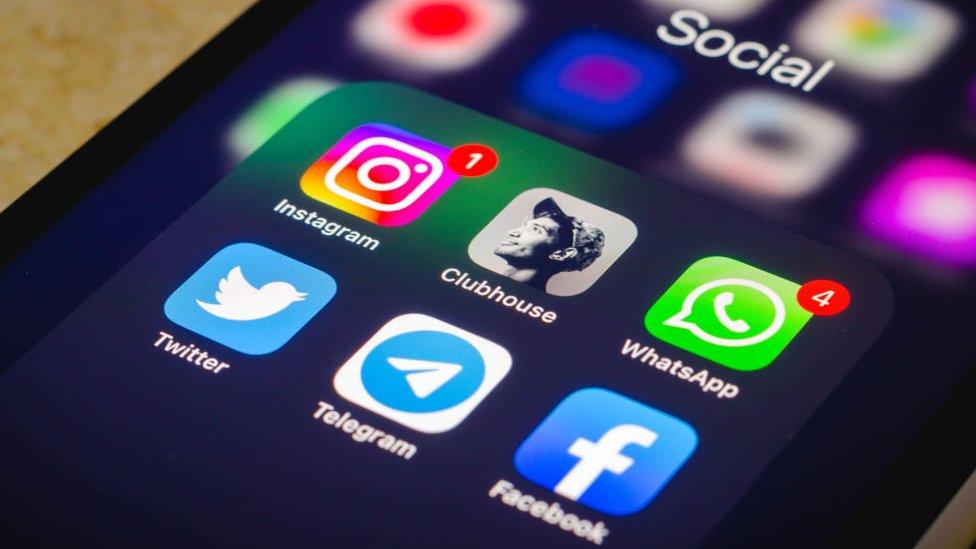Social media boycott: Prince William and British sport taking action over online abuse
- Published
- comments

Prince William has joined professional sports clubs and athletes from around the UK, to boycott social media.
To boycott something means to stop using it, stop buying it, or stop engaging with it to bring about change.
The plans were originally announced by the organisations that run English football, after clubs including Swansea City, Birmingham City and Rangers took part in a week-long social media boycott, in protest at the treatment that many of their players had experienced online.
Teams from the world of cricket, cycling and rugby have now switched off their Facebook, Twitter and Instagram accounts too, in the hope it will encourage social media companies to do more to stamp out online hate.
The clubs also want social media companies to see the importance of educating people in the ongoing fight against discrimination.
The boycott will began at 3pm on Friday and will end at one minute to midnight on Monday.
Some sports brands, sponsors and broadcasters will also be taking part.
Prince William said: "As President of the FA I join the entire football community in the social media boycott this weekend.
Who is taking part?
Football:
The Football Association (FA), Premier League, English Football League (EFL), FA Women's Super League, FA Women's Championship, Professional Footballers' Association (PFA), League Managers Association (LMA), Professional Game Match Officials Limited (PGMOL), Anti-racism charity Kick It Out, Football Supporters' Association (FSA), UEFA - European football's governing body, Scottish FA, Scottish Professional Football League, Scottish Women's Football and PFA Scotland
Rugby Union:
England Rugby, Scottish Rugby, Welsh Rugby, Premiership Rugby, many clubs and the Rugby Players' Association
Rugby League:
The Rugby Football League, Super League Europe, Rugby League World Cup 2021 and the Rugby League Players' Association
Cricket:
The England and Wales Cricket Board, first-class counties, women's regional teams and the Professional Cricketers' Association
Broadcasters, sponsors and manufacturers:
Premier League and Women's Super League sponsor Barclays, England sponsor Nationwide and broadcasters Sky Sports, BT Sport, Talksport and Adidas
British Cycling, British Horseracing, Great Britain and England Hockey, and the Lawn Tennis Association are also involved.
Efforts have been made to stop racism in football, but many players are still facing abuse online
Why are clubs and organisations taking action?
The abuse of sports stars is a massive issue, with players facing racism, aggression and trolling online.
Two years ago, a number of footballers took part in the #Enough campaign - a 24-hour social media boycott in protest at online abuse, but players across all sports continue to face abuse.
When the move was announced, the English Football League released a statement saying: "As a collective, the game recognises the considerable reach and value of social media to our sport. The connectivity and access to supporters who are at the heart of football remains vital."
English football called for social media companies to introduce filtering, blocking and to quickly take down offensive posts.
Racism in football: What is the situation for professional players?
They also asked them to change the rules so people will have to have a verified account, meaning they cannot be anonymous or keep making new accounts.
English football said there should be more help for law enforcement agencies to identify and prosecute people who make and post illegal content.
Other bodies who have now joined the movement have called for similar action.
PFA, the independent trade union for professional footballers in Scotland, chief executive Fraser Wishart said: "The abuse by those hiding behind keyboards must stop,"
"We call upon social media companies to engage in meaningful dialogue with a view to providing a mechanism to stop and report all forms of abuse to the relevant authorities.
"Comments can be hurtful to players and their families and have a profound effect on their lives. In 2021 our members deserve much better."
Many sports stars, including Marcus Rashford, have faced racist abuse online
Celtic have also highlighted "racial and sectarian attacks and horrendous personal abuse" against their players, staff and fans as they backed the boycott.
"This is something which simply has to stop," they said. "Abusing someone because of the colour of their skin, abusing an individual due to their religion, unacceptable personal attacks or pathetically mocking the death of a loved one - our players, staff and supporters have, tragically, experienced it all through social media.
"We must all make a stand and together defeat this negative, damaging behaviour, which inflicts so much harm."
WATCH: Advice to help you if you're upset about racism
What have social media companies said?
The UK government has previously threatened social media companies with "large fines" which could amount to "billions of pounds" if they fail to tackle abuse on their platforms.
Facebook said in February that tougher measures would be taken to tackle the issue and Instagram, which is owned by Facebook, has announced a tool to enable users to automatically filter out abusive messages from those they do not follow on the platform.
Twitter released a statement in February, which said it is "resolute in our commitment to ensure the football conversation on our service is safe for fans, players and everyone involved in the game".
The company added it had removed more than 7,000 football-related tweets in the UK that violated its rules.
- Published12 April 2021
- Published1 April 2022
- Published31 January 2021
